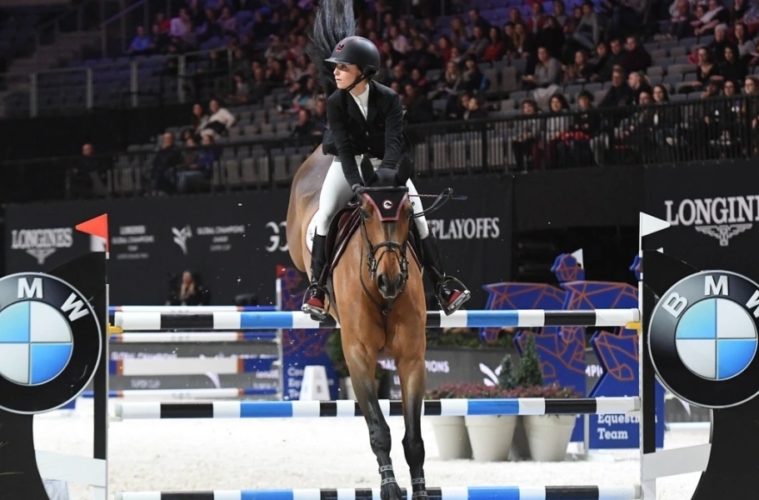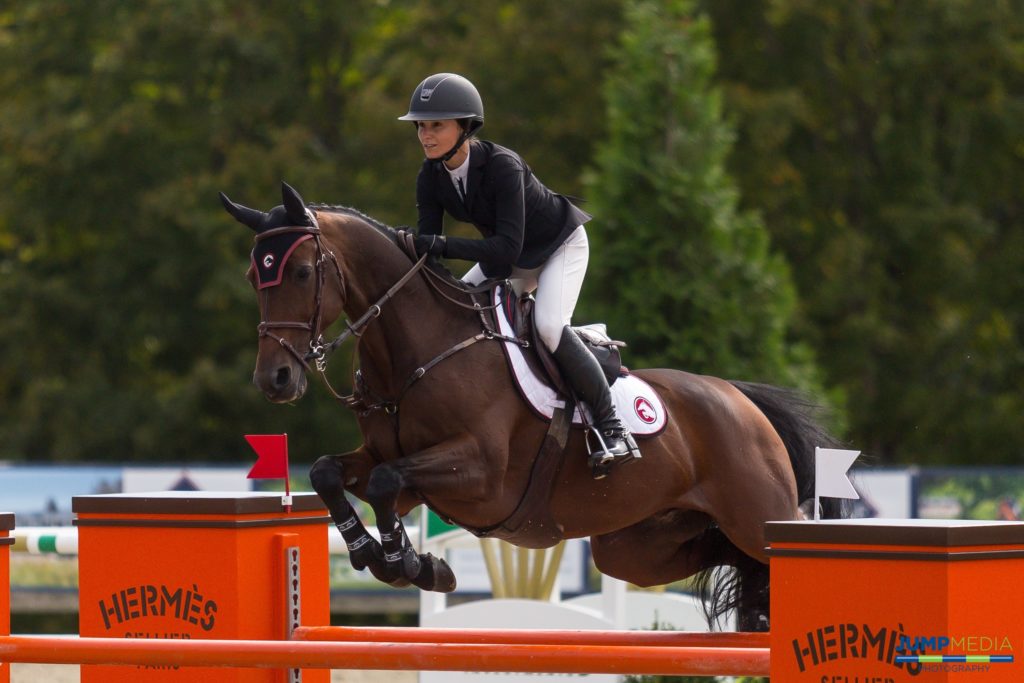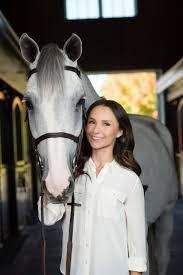Georgina Bloomberg is an international U.S. show jumper with numerous accolades to her name. After success as a junior and young rider, Georgina made her Nations’ Cup debut in 2005 riding in the Samsung Super League Nations’ Cup in La Baule, France, where she was a member of the all-female winning team. Georgina also competed at her first World Cup Finals in 2009 and most recently again in 2019.
She has continued to be a consistent contender at the grand prix level, winning events such as the $210,000 Central Park Grand Prix in New York in 2014 and the $127,000 Adequan Grand Prix in Wellington, Florida, the following year.
With the advent of the innovative Global Champions League in 2016 as part of the Longines Global Champions Tour, Georgina signed on as the team owner of New York Empire where she competes alongside of Shane Breen (IRL), Daniel Bluman (ISR), Scott Brash (GBR), Denis Lynch (IRL), and Spencer Smith (USA).
In addition to her athletic pursuits, Georgina is dedicated to philanthropy, founding The Rider’s Closet, an organization that helps make riding clothes more accessible to youth in need, and is a passionate animal activist.
We recently asked Georgina for her perspective on showing horses at night, under the lights. Here are her responses, which reflect her years of experience and ability to balance the will to win with her horses’ well-being.
JN: Is jumping under lights different than day for a rider?
GB: For most riders, jumping at night feels more important than during the day for a few reasons. First, we tend to get a bigger crowd at night. More of the general public are able to attend in the evenings and having people in the stands cheering us on creates an electric atmosphere that I know we all appreciate. We get more nervous because it reminds us that we are entertaining people and putting on a show, but it also gives us a lot more satisfaction and makes us feel recognized and appreciated for going out there and doing what we do!
It also gives our fellow equestrians a chance to watch the class. During the day, everyone is busy and at most shows, they are tied up with other classes and rings, as well as day-to-day tasks that require our attention and time. Many riders that compete in the classes under the lights also have training and showing duties for their clients. Competing at night guarantees that we can focus on that one particular class without the other factors.
JN: For the horse?
GB: Most horses feel a little different under the lights, but the good ones will feel better. Schooling areas don’t tend to be as well-lit as the main ring. So, you need a brave horse, not just for the big ring but to make sure your preparation goes well. Anything can happen and if your horse isn’t brave and something goes wrong in the schooling area, you may need to call it a night.
For me, I don’t take an inexperienced horse or horse who isn’t careful under the lights. There are a lot of factors in night classes that can cause issues with less experienced horses, including shadows, bigger crowds, and a rider’s nerves. If I don’t have a confident horse and I make a mistake—which everyone will do on occasion—I’m much less likely to get away with it. If things go terribly wrong, it can ruin a horse.
In addition to being brave and careful, horses best suited to compete under the lights are also able to handle meeting a jump at a less-than-perfect distance. They are horses that have become a touch more careful due to the spookiness of the shadows and lights on the jumps and in the arena. There is a different look to the rails, the water, and the liverpool under lights, and when you add in the shadows it can back a horse off of the obstacle. If you have a particularly confident or strong horse, having the horse back off so they can properly size up the obstacle can work to your benefit.
Sometimes, we are lucky enough to sit on a horse that knows the night class means it’s a special occasion. They don’t change anything other than trying a little harder and knowing that they are under a spotlight and there to do a job.
JN: Is there anything you would do to prepare a horse for their first time under the lights?
GB: There is very little we can do to prepare a horse for its first class under the lights other than try to find the smallest class available. As I mentioned, I have horses that I would never enter in a night class because I know that it’s not the best decision for them, or that if I were to make a mistake, the consequences would be too big. There are very few night classes that are not grand prix, so it’s not easy to jump a few small classes to get our horses used to the lights. Ultimately, you have to get in the ring and hope it goes well.
As a rider, you also need to be smart about it and enter the main arena with a positive warm up. If anything goes wrong or there is any doubt in your mind it’s not the right time for that horse, it’s likely best to sit it out. It’s also important to know when to retire. If you have a few rails but the horse feels comfortable and they were just simple mistakes, then it can be a great learning experience for both horse and rider.
On the flip side, if things happen that are going to scare either of us or make it a bad experience for the horse, it’s best to pull up and try another day. I have found that one of the bravest things a rider can do is accept that quitting for the day or night is not defeat, it’s being wise enough to realize that putting the horse first means swallowing your pride and deciding to try again next time.
JN: What changes, if anything, about the distances under the lights and a venue?
GB: If a horse is nervous or backed off, the distances obviously get longer, and a rider needs to make sure to ride more forward and keep their leg on more than usual. For even the bravest horse, the water jump can look different than it did during the day, so you have to be prepared and not take anything for granted. While it can be a good thing to have a horse back off the jumps a bit, too much can be a bad thing and even a little mistake or less than perfect distance can lead to a dangerous outcome.
For some smaller arenas, night classes that bring in more spectators can be distracting because the crowd can feel like they are on top of you or catch you or your horse’s eye when you are trying to focus on the course. More people always lead to more noise and opportunities to distract us with simple things like an umbrella or a sudden movement. If a venue is built to get the crowds close to the action, the stands will look very different when they are full than when they are empty.
For me, despite these challenges, I love night classes. I sometimes have trouble focusing on multiple classes throughout the day and I like having one particular class where I can give it my all. Preparing for the big night classes also makes me the right amount of nervous and on edge, which for many athletes can bring out the best. The way I see it is, if you don’t want everyone watching what you think you can do, you shouldn’t be out there under the lights in the first place.
Here is Georgina Bloomberg with her superstar Chameur 137 jumping their way to 7th place under the lights in the 5* Grand Prix at the Winter Equestrian Festival in 2019. Video credit to Equestrian Sport Productions.



